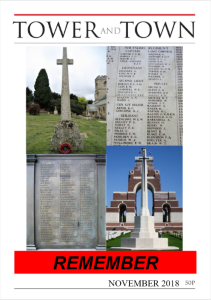

Tower and Town, November 2018 (view the full edition) (view the full edition)Quakers in WWIThe Quakers declared their commitment to peace in 1660, soon after their foundation by George Fox in that turbulent period after the Civil War with 'the world turned upside down', and since then they have consistently opposed all wars, and the greed, lies and injustice that can lead to wars. Most Quakers tried to counteract the jingoism before 1914 and resisted the call to arms. Some volunteered for the Friends Ambulance Service or the Friends War Victims Relief Committee (FWVRC) to relieve suffering at the front. Others assisted on the Home front and campaigned for peaceful resolutions. When conscription was imposed in 1916, many Quakers of military age chose to register as conscientious objectors (COs), while a small but significant number joined up, feeling this was the quickest way of ending the war. Humanitarian Relief: The FWVRC helped with building, medical aid and agriculture; in France they built homes for thousands of displaced people and ran hospitals in three centres with district nursing, dental and maternity care. They also did similar work in Austria, Hungary, Poland, Serbia, Germany, Belgium and the Netherlands, and in Russia they continued to feed thousands of peasants in the famine of 1921-22. Caring for the Wounded: The Friends Ambulance Unit was a volunteer service set up in 1914, supporting the wounded from the French divisions in the Champagne and Argonne regions and sharing many of the risks and horrors with the men in the trenches. Assisting Enemy Aliens: The Aliens Restriction Act of 1914 required all German or Turkish residents in Britain to register; they were initially restricted to within five miles of their homes and later many males were interned, leaving their families destitute. The Friends Emergency Committee found homes for stranded people, helped find them work and supported men held in internment camps. Conscientious Objection: after conscription came in in 1916, all unmarried men of working age had to join the armed services. Quakers, believing that there is that of God in every person, believe it is wrong to take life. They therefore registered as 'objectors' under the 'conscience clause' of the Military Service Act; some were prepared to do alternative non-combatant work such as in the Medical Corps or farming (the 'alternativists'), other COs (the 'absolutists') rejected any war-related work and refused to obey military orders. Many COs were turned down by the tribunals, sent to the front, imprisoned in solitary confinement and with 'field punishments' and a few were condemned to death, but the sentences were commuted to hard labour up to 1919. Campaigning for Peace: Quakers were actively involved in campaigning for peace before, during and after the war. Work included campaigning against the militarism that lead to the war, challenging the introduction of conscription, supporting conscientious objectors in prison, and resisting censorship laws by publishing without submission to the censor. Barney Rosedale |